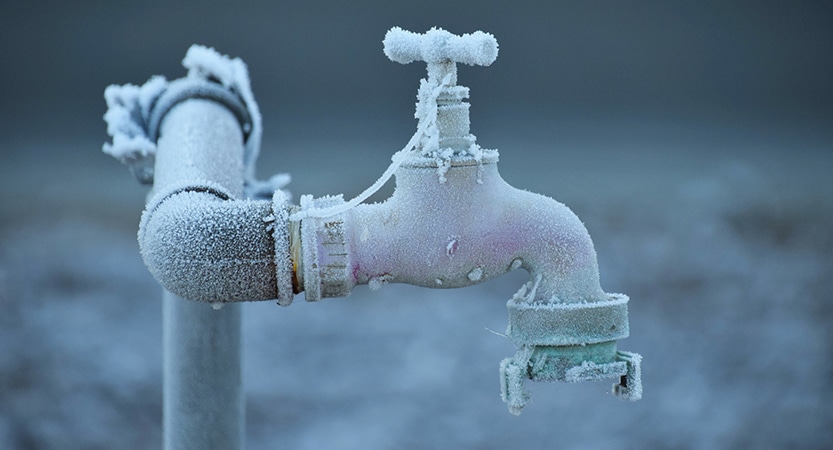This post on the next paragraphs about How to Prevent Your Pipes From Freezing is pretty much insightful. Read it yourself and see what you think about it.

Cold weather can damage your pipes, specifically by freezing pipes. Here's just how to avoid it from occurring and what to do if it does.
Introduction
As temperature levels drop, the threat of icy pipelines increases, potentially causing expensive fixings and water damages. Recognizing exactly how to avoid icy pipes is essential for homeowners in cold environments.
Comprehending Frozen Pipes
What causes pipelines to ice up?
Pipes ice up when subjected to temperatures listed below 32 ° F (0 ° C) for expanded durations. As water inside the pipelines ices up, it expands, putting pressure on the pipe walls and potentially causing them to burst.
Risks and damages
Icy pipelines can bring about water supply disruptions, residential property damage, and expensive fixings. Ruptured pipes can flood homes and create substantial structural damages.
Indications of Frozen Pipeline
Recognizing frozen pipelines early can stop them from bursting.
Just how to identify icy pipes
Try to find decreased water flow from taps, unusual odors or sounds from pipelines, and visible frost on revealed pipes.
Avoidance Tips
Protecting prone pipes
Cover pipes in insulation sleeves or utilize heat tape to safeguard them from freezing temperatures. Concentrate on pipes in unheated or exterior locations of the home.
Home heating strategies
Maintain indoor rooms properly warmed, specifically areas with pipes. Open closet doors to allow cozy air to circulate around pipes under sinks.
Securing Outdoor Plumbing
Garden hose pipes and exterior faucets
Disconnect and drain pipes garden hose pipes before winter. Mount frost-proof spigots or cover exterior faucets with shielded caps.
What to Do If Your Pipes Freeze
Immediate activities to take
If you presume frozen pipes, maintain faucets open up to eliminate stress as the ice melts. Make use of a hairdryer or towels soaked in hot water to thaw pipes gradually.
Long-Term Solutions
Architectural changes
Take into consideration rerouting pipelines away from exterior walls or unheated locations. Include additional insulation to attics, cellars, and crawl spaces.
Updating insulation
Purchase premium insulation for pipes, attic rooms, and walls. Proper insulation aids keep regular temperature levels and decreases the risk of frozen pipes.
Verdict
Avoiding icy pipes requires aggressive steps and fast feedbacks. By recognizing the causes, signs, and safety nets, homeowners can protect their pipes throughout winter.
Helpful Tips to Prevent Frozen Pipes this Winter
UNDERSTANDING THE BASICS: WHY PIPES FREEZE AND WHY IT’S A PROBLEM
Water freezing inside pipes is common during the winter months, but understanding why pipes freeze, and the potential problems it can cause is crucial in preventing such incidents. This section will delve into the basics of why pipes freeze and the associated problems that may arise.
THE SCIENCE BEHIND FROZEN PIPES
When water reaches freezing temperatures, it undergoes a physical transformation and solidifies into ice. This expansion of water as it freezes is the primary reason pipes can burst. As the water inside the pipe freezes, it expands, creating immense pressure on the walls. If the pressure becomes too great, the pipe can crack or rupture, leading to leaks and water damage.
FACTORS THAT CONTRIBUTE TO PIPE FREEZING
- Low Temperatures: Extremely cold weather, especially below freezing, increases the risk of pipes freezing.
- Uninsulated or Poorly Insulated Pipes: Pipes located in unheated areas, such as basements, crawl spaces, or attics, are more prone to freezing. Insufficient insulation or lack of insulation altogether exacerbates the problem.
- Exterior Wall Exposure: Pipes running along exterior walls are susceptible to freezing as they encounter colder temperatures outside.
- Lack of Heating or Temperature Regulation: Inadequate heating or inconsistent temperature control in your home can contribute to frozen pipes.
PROBLEMS CAUSED BY FROZEN PIPES
WHY CERTAIN PIPES ARE MORE PRONE TO FREEZING
- Pipe Bursting: As mentioned earlier, the expansion of water as it freezes can cause pipes to burst, resulting in significant water damage.
- Water Damage: When pipes burst, it can lead to flooding and water damage to your property, including walls, ceilings, flooring, and personal belongings.
- Structural Damage: Prolonged exposure to water from burst pipes can compromise the structural integrity of your home, leading to costly repairs.
- Mold and Mildew Growth: Excess moisture from water damage can create a favorable environment for mold and mildew growth, posing health risks to occupants.
- Disrupted Water Supply: Frozen pipes can also result in a complete or partial loss of water supply until the issue is resolved.
https://busybusy.com/blog/helpful-tips-to-prevent-frozen-pipes-this-winter/
- Location: Pipes located in unheated or poorly insulated areas, such as basements, crawl spaces, attics, or exterior walls, are at higher risk of freezing.
- Exterior Pipes: Outdoor pipes, such as those used for irrigation or exposed plumbing, are particularly vulnerable to freezing as they are directly exposed to the elements.
- Supply Lines: Pipes that carry water from the main water supply into your home, including the main water line, are critical to protect as freezing in these lines can affect your entire plumbing system.
- Underground Pipes: Pipes buried underground, such as those connected to sprinkler systems or outdoor faucets, can be susceptible to freezing if not properly insulated.

Do you like reading up on Winter Plumbing Precautions: Preventing Frozen Pipes? Leave a remark directly below. We'd be glad to hear your reactions about this blog posting. In hopes that you visit us again later on. Are you aware of somebody else who is serious about the niche? Do not hesitate to share it. Many thanks for taking the time to read it.
Estimating
Comments on “Crucial Advice to Avoid Frozen Pipes in Winter: Specialist Insights”